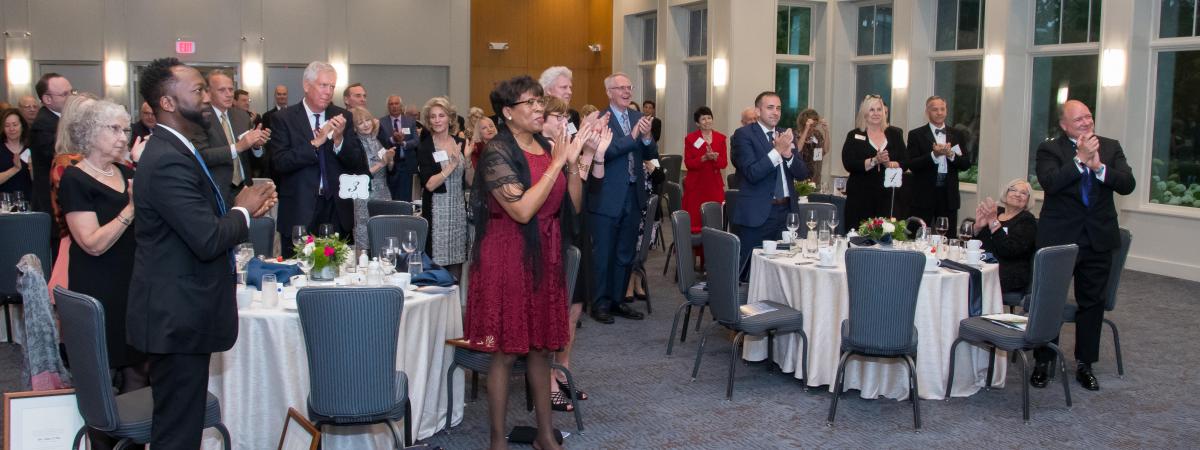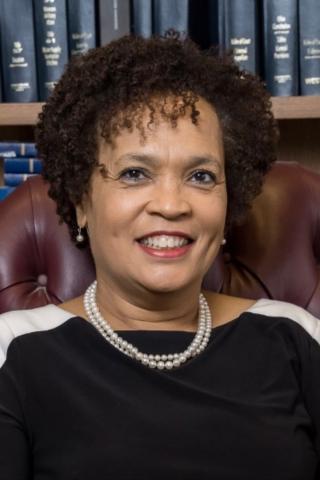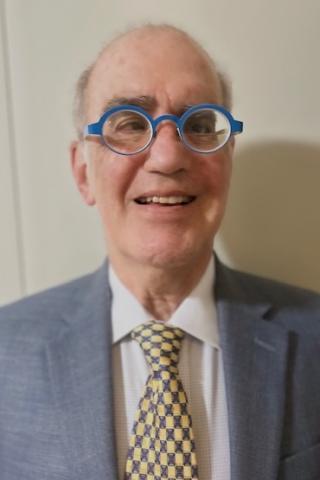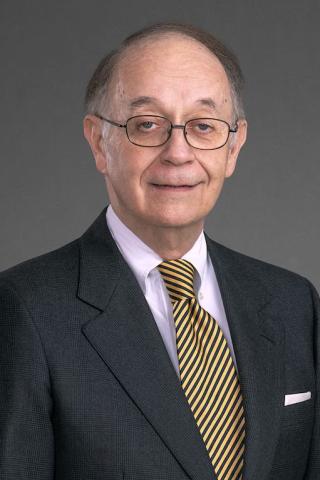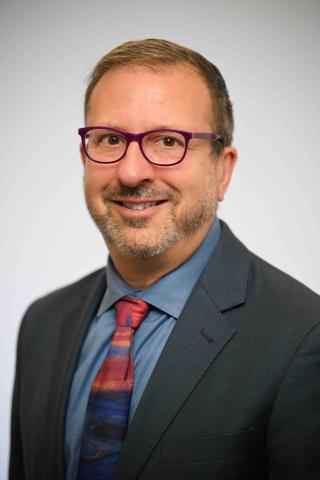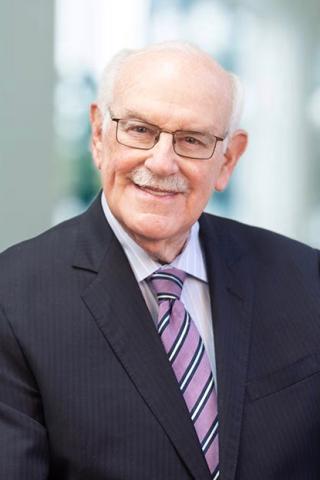Every year, Case Western Reserve University School of Law honors the achievements of distinguished alumni, faculty and prominent members of the legal community by inducting new members to the Society of Benchers – the law school’s Hall of Fame.
Established in 1962, the Society of Benchers inducts new members on the basis of extraordinary achievement and dedication to the highest principles of the legal profession, as voted on by their peers.
This year, we celebrate 11 new members of the Society of Benchers.
William Allport started his legal career at Baker Hostetler in Cleveland, Ohio where he worked in labor relations for six years. For the next 20 years, until 1995, he was with Leaseway Transportation Corporation as vice president, chief labor counsel and executive officer. In that position, he was responsible for the corporation’s labor law, labor relations and human resources, reporting directly to the CEO. He was responsible for administering over 300 collective bargaining agreements, including national agreements with the Teamsters and the United Auto Workers Unions. He was also responsible for litigation at Leaseway at the state and federal levels. In 1995, Leaseway was acquired by Penske Logistics and Truck Leasing. Allport became Penske Logistics’ vice president of labor and human resources. He was responsible for 180 labor contracts, including negotiation and administration, and all state and federal litigation. His office handled all EEOC, NLRB, OSHA, arbitrations, Wage and Hour, Unemployment Compensation and Workers' Compensation matters. Allport retired from Penske Logistics in 2010 after 41 years of labor law practice.
After retiring from Penske Logistics, Allport became self-employed and up until very recently, he arbitrated and mediated labor and employment matters as a member of the Federal Mediation and Conciliation Service (FMCS), the American Arbitration Association (AAA), the Financial Industry Regulatory Authority (FINRA) and the Ohio State Employment Relations Board (SERB).
Allport has remained very engaged with the law school. He partnered with his classmates to create the Lew Katz Scholarship Fund. He also served as the Law Alumni Board president from 1984 to 85 and chaired its Annual Fund Committee from 1983 to 84. Allport has served on the Boards of Directors for the Red Cross, Junior Achievement, Boy Scouts and the West Side Food Bank. He also served as a WVIZ fundraising volunteer.
Allport’s daughter and son-in-law, Christine and David Lewanski, also graduated from CWRU School of Law.
A 1991 graduate of Case Western Reserve University School of Law, James “Jim” Chen is a
shareholder at Babst, Calland, Clements & Zomnir, PC. Babst Calland is headquartered in Pittsburgh, Pennsylvania with offices throughout the region. Chen serves as the head of the firm’s Transportation Technology and Energy group and is based at the firm’s Washington D.C. office.
Chen joined Babst Calland after over a decade as an executive at several successful start-up electric vehicle (EV) manufacturers, notably as vice president of regulatory affairs at Tesla from 2010 to 2016, and as vice president of public policy and chief regulatory counsel at Rivian Automotive, LLC from 2018 to 2023. In those positions, he led the teams supporting the launch of iconic EVs like the Tesla Model S, X and 3, and Rivian’s R1T, R1S and Amazon delivery van. In addition to those vehicle launches, his work included paving the way for new sales and service approaches (e.g., manufacturer direct sales/service) through legislative and regulatory means; establishing large-scale, commercial transactions of emission credits between manufacturers; and working with policymakers, regulators, and government leaders to
support the establishment and growth of modern EVs in the United States. Chen also served as general counsel and corporate secretary at two other start-up EV manufacturers. Prior to serving in-house, Chen was a partner at Hogan & Hartson LLP (now Hogan Lovells) and later Crowell & Moring, LLP. He began his legal career as an Honors Hire at the U.S. Environmental Protection Agency’s Office of Enforcement.
Chen and his wife reside in New Hampshire where he is active in the local community. He currently serves as a National Ski Patrol-credentialed patroller at Ragged Mountain and Tenney Mountain resorts. In both roles, he promotes the safety of the skiing public while providing emergency medical assistance and transportation off the slopes for injured guests. Prior to his move to New Hampshire, he was the patrol director for the Liberty Mountain Ski resort in Carroll Valley, Pennsylvania where he was a patroller for nearly three decades. Chen also currently serves on several committees for the School of Law.
Informed by her extensive experience and supported by her strong interpersonal, problem-solving and communications skills, Angela Birch Cox is a leader, strategist and innovator with high integrity.
She had a distinguished legal career at The Coca-Cola Company, where she served as SVP and general counsel of the $2 billion Minute Maid Company division and assistant general counsel of Coca-Cola North America. She also managed the legal affairs of the Innovation, Odwalla and Canada business units and the Global Supply Chain and Innovation groups, was Chief Global Patent Officer and practiced in the Company’s Trademarks, Corporate, Competition and European Community (now European Union) departments.
After leaving Coca-Cola, she pursued her passion to serve through local nonprofits. First, with United Way of Greater Houston, where she increased donations at multiple top ten accounts and created innovative account management tools used organization wide. She recently retired from Houston Habitat for Humanity, where she led strategy, development, volunteer services, communications and community relations, including raising over $15,000,000 for repair of 600 homes damaged by Hurricane Harvey and culminating in the development of an 127-acre, affordable, mixed income housing community.
Cox earned J.D., cum laude, from Case Western Reserve University and B.S. degrees from Spelman College, magna cum laude and Georgia Institute of Technology. She also completed the Kellogg Management Institute and the Women’s Director Development Program, both at Northwestern University.
Cox is the immediate past board chair of the Council on Continuing Legal Education Opportunity, the nation’s preeminent legal pipeline program and has served on the boards of the Council of Better Business Bureaus, the American Frozen Food Institute (Chair) and the Houston Bar Foundation (Vice-Chair). She also served on Case Western Reserve Law School’s Canada-U.S. Law Institute, Visiting Committee and Alumnae Association Board of Governors. She has been honored with the CLEO EDGE and Blakey Diversity Pipeline Architect, the Spelman College Outstanding Alumnae in Law and Business and the CWRU School of Law Distinguished Recent Graduate awards. She is also listed in Marquis’ Who’s’ Who.
The entirety of Judge William Fee’s legal career has been dedicated to public service. Upon graduation from Case Western Reserve School of Law in 1980, he received a fellowship to represent low-income clients in courts throughout Central Indiana. At the urging of friends, he returned to his hometown of Angola, Indiana to run for judge. He was elected in 1984 as one of the youngest judges in the state. Now approaching retirement at the end of his current term in 2026, he will leave the bench as one of the state’s longest serving judges.
During his tenure, Judge Fee’s service has been dedicated to improving the ability of the courts to be accessible, effective and responsive. Twice appointed chair of the Domestic Relations Committee of the Indiana Supreme Court, he played an instrumental role in refining and implementing guidelines for child support and parenting time. He has championed the use of voluntary summary hearings in divorce cases to bring litigants, particularly parents, before a judge early and in a summary way that an increasing population of self-represented litigants find accessible. He was an early advocate of mediation for parents, recognizing that the adversary system can be damaging to the on-going trust required for co-parenting and prioritizing the best interests of the child.
The challenges of custody cases led him to the Association of Family and Conciliation Courts (AFCC). AFCC is a 6,000-member organization of professionals, attorneys, judges, mental health providers, mediators and others dedicated to reducing the trauma of divorce upon families, particularly children. He held various leadership positions and served as president from 2007–2008.
Judge Fee served as co-chair of the Indiana Supreme Court’s Task Force on Evidence Admission. He played a central role in moving Indiana to rules of evidence from a case precedent-based system. These Rules of Evidence, adopted in 1994, have provided clearer guidance for judges and attorneys ensuring that evidentiary rulings are handled consistently and fairly across the state.
He has taught at judicial conferences and locally at Trine University (formerly Tri-State University). He serves on the Board of the Indiana Judge’s Association. He is a member of two Supreme Court Committees: Court Innovations and Strategic Planning. Locally, he serves on the board of the Heritage Club, a senior center. He serves as chair of his church council. The Indiana Coalition Against Domestic Violence selected him as its Outstanding Judge recipient for 2000. In 2002, he received a “Champion for Children” award for his local efforts in establishing a safe exchange and supervised visitation center.
A few years ago, Judge Fee, along with other judges and local officials embarked upon a plan to replace the historic 1868 Steuben County Courthouse with a modern judicial center. The Judicial Center opened to acclaim in 2024. At its dedication, as he stood in front of the beautiful new building, Judge Fee injected his view of its significance. “I’m happy” Fee said, “because of something we can’t see. We’re all united behind an ideal, the rule of law, of justice.”
Judge Emanuella Groves was elected to the Ohio Eighth District Court of Appeals on November 3, 2020, for a term commencing on February 11, 2021. Since 2001, Judge Groves had served on the Cleveland Municipal Court. In 2017, while on the municipal bench, Judge Groves found the Greater Cleveland Regional Transit Authority’s (RTA) HealthLine’s fare enforcement practice was unconstitutional. RTA law enforcement officers requiring passengers to prove fare payment without probable cause of fare evasion was immediately halted. The Pittsburgh Gazette reported that Pittsburgh abandoned its plan to adopt the practice because of Judge Groves’ decision.
Judge Groves was committed to impacting the lives of the people who appeared before her. She created several programs, including a GED program where over 600 participants secured their GEDs. She was the Cleveland Municipal Court specialized mental health docket judge from 2016 to 2021, where her commitment to help participants manage their mental health was recognized by both the Cleveland National Alliance on Mental Illness (NAMI) and the Alcohol, Drug Addiction & Mental Health Services (ADAMHS) boards.
Judge Groves is co-founder and was co-chair of the Ohio Black Judges Association, Inc., established in 2021. She sat on the Ohio Supreme Court in June 2022. She serves on the Ohio Supreme Court Commission on the Rules and Practice and chairs the Criminal Rules Committee. She served on the Ohio Judicial Conference Executive Committee. Among other legal committees she served, she chaired the Cleveland Metropolitan Bar Association Bar Admissions Committee.
Judge Groves has received two national awards. She was presented the Sara J. Harper Humanitarian Award in Los Angeles, California from the National Bar Association Judicial Council. Among many local awards, Judge Groves received the Cleveland NAACP Community Leadership Award, the inaugural Case Western Reserve University Black Law Student Association Sankofa Alumnae Award, and the Norman S. Minor Bar Association Trailblazer Award.
Judge Groves is a graduate of Case Western Reserve University School of Law. She was admitted to practice before the United States Supreme Court in 1987. She returned to Case as an adjunct professor from 2017 to 2019. She earned her Certification in Judicial Development from the Judicial College in Reno, Nevada.
Judge Groves is married to attorney Greg Groves. They are the proud parents of two children, both Princeton University graduates. Her daughter and son-in-law are attorneys, while her son and daughter-in-law are education professionals. She is a member of Olivet Institutional Baptist Church and the Greater Cleveland Alumnae Chapter of Delta Sigma Theta, Inc.
Thomas I. Hausman has been a practicing attorney since 1973. He started his own law firm in 2015, after having spent the prior five years as of counsel to the Cleveland law firm of Schneider Smeltz Ranney & LaFond. Hausman is the only lawyer in his firm, The Law Office of Thomas I. Hausman, LLC. Hausman specializes in the areas of tax, partnership and corporate practice, estate planning and tax controversies. He counsels clients on, and prepares, partnership and LLC operating agreements, succession planning documents, mergers and business acquisition agreements, wills, trusts, like-kind exchange agreements, and generally represents businesses in their regular business needs. He regularly counsels clients who desire to invest in businesses and real estate ventures. In addition, he represents clients in tax controversy matters before the Internal Revenue Service, the Ohio Board of Tax Appeals and the United States Tax Court. He prepares and assists clients in preparing IRS offers in compromise and payment plan requests.
Since 1992, Hausman has taught tax law at Case Western Reserve University School of Law. From 1994 to 2005, he was a full-time faculty member of the Law School, where he was the Administrative Director of the School’s Graduate Tax (LLM) Program. He continues to be an adjunct professor at the Law School, teaching courses in estate planning, corporate tax and partnership tax.
Hausman is a frequent speaker at the Cleveland Tax Institute, and was the general chairman in 1996. He is a member of the American Bar Association, Section of Taxation, Partnership Sub-Committee; and the Ohio State Bar Association. He is also a member of the Federal Tax Specialty Board, Ohio State Bar Association, 2000 to date.
Hausman graduated from the University of Colorado in 1970, and received his JD from the Ohio State University School of Law in 1973. He also received an LLM Tax degree from New York University School of Law in 1976.
Hausman started his law career as an Ohio Assistant Attorney General from 1973 to 1975. He joined the Cleveland law firm of Kadish Krantz and Weiss in 1976, and he has practiced at various other law firms since then, including, McDonald Hopkins and Hardy, Kahn Kleinman Yanowitz and Arnson, Baker & Hostetler, and Singerman Mills Desberg and Kauntz.
Paul Marcela is the founder and president of Governance Partners Group, LLC, a corporate governance services firm that specializes in providing external Corporate Secretary and related corporate governance services to private companies, small to mid-cap public companies, and not-for-profit organizations that seek to outsource all or a portion of their Office of the Corporate Secretary operations. GPG provides services in the categories of Board of Directors and Board Committee support and corporate governance program and process development and enhancement.
Previously, Marcela has been vice president, general counsel and secretary of two substantial Cerberus Capital Management portfolio companies between 2009 and 2015 and served as financial counsel to Dow Corning Corporation between 1985 and 2009, most recently as associate general counsel and secretary. He was a member of the silicone implant mass tort crisis resolution team relative to corporate governance, securities disclosures, debt negotiation and Chapter 11 preparedness. He led the Law Department’s Business & Finance Section. Marcela's early years of legal practice were with the Cleveland law firms of Seeley, Savidge & Aussem and Meyers, Hentemann, Schneider & Rea between 1981 and 1985. Marcela's primary legal practice areas have been corporate governance, securities regulation, mergers and acquisitions, corporate finance, litigation management, estate planning and probate.
He has served the legal profession as vice president and secretary of the Private Directors Association, president of the Michigan Chapter and a vice president of the Georgia Chapter of the Association of Corporate Counsel and a member of the Board of Directors and chair of the Private Companies Committee of the Society for Corporate Governance.
Marcela has been active in support of Case Western Reserve University and its law school. He served as president of the Law Alumni Association between 2009 and 2011 and served on the University Alumni Association Board of Directors as Chair of its Governance & Nominating Committee and is now a Director Emeritus. He is also a member of the Law School’s Visiting Committee.
Marcela earned a JD from Case Western Reserve University, an MBA from Central Michigan University and a BS in Economics and Political Science from Allegheny College.
Richard Newcomb has had considerable international experience dealing with target governments, front-line states, like-minded allies, multilateral organizations (the United Nations, the European Union and others), financial and business communities worldwide and others who are responsible for compliance with asset controls and economic sanctions and embargo programs.
Newcomb joined DLA Piper as Partner after chairing the International group at Baker, Donelson, Bearman, Caldwell and Berkowitz. He served as chair of the DLA Piper International Trade Practice Group from 2008 to 2023.
From 1987 to 2004, Newcomb served as director of the Office of Foreign Assets Control (OFAC) of the United States Treasury Department. Throughout his tenure, Newcomb oversaw the administration and enforcement of some 39 economic sanctions programs in furtherance of US foreign policy and national security goals. His leadership guided the agency through many of the major foreign policy challenges the nation has experienced in the past two decades, from the advent of multilateral sanctions against Iraq in 1990—coupled with a protective blocking of Kuwaiti assets—to the transformation of the agency after the attacks of September 11, 2001, to track and disrupt terrorist organizations and their financing networks.
While at OFAC, Newcomb was responsible for implementing economic sanctions and asset controls against Burma, Cuba, Iran, Liberia, Libya, Sudan, Zimbabwe, narcotics traffickers in Colombia and narcotics kingpins and their networks operating worldwide, as well as for maintaining the prohibition against financial transactions with Syria. Other economic sanctions that he implemented and saw through to completion included programs targeting the Taliban, North Korea, Serbia, Angola, Haiti, South Africa, Panama, Vietnam and Cambodia.
Throughout his time at OFAC, the agency played a significant role within the domestic and the international communities, confirming that economic sanctions can be an effective tool of international diplomacy. The strategies developed under his leadership and supervision for implementing sanctions and targeting terrorists are among the principal tools used today to wage the war on terrorism, terrorist financing and on rogue nations for actions inimical to the national security and foreign policy of the United States.
Prior to his assignment with OFAC, Newcomb held a number of other positions in the U.S. Treasury Department, including Director of the Office of Trade and Tariff Affairs and Deputy to the Assistant Secretary (Regulatory, Trade and Tariff Affairs), where he was the principal advisor for enforcement on customs, international trade, commercial and regulatory matters.
Judge Mary Jane Trapp is recognized throughout the State of Ohio for her distinguished legal knowledge and experience. Judge Trapp returned to the bench in February 2019, having previously served as a judge on the Eleventh District Court of Appeals from 2007 to 2013. She served as its administrative judge in 2008 and as its presiding/administrative judge in 2009, 2010, and 2021. She also served as a visiting judge on the Supreme Court of Ohio and in four sister districts by assignment of the Chief Justice.
She has served on nine Supreme Court of Ohio commissions, committees, and task forces to develop policy for the bench and bar, and served on Ohio Judicial Conference and College committees, including continuing service on the Ohio Jury Instructions Board of Editors, which she co-chairs, and on the Appellate Law and Procedure Committee. A member of the Executive Committee of the Council of Chief Judges of the State Courts of Appeal and chair of its Education Committee, she is the immediate past president of the William K. Thomas American Inn of Court.
Judge Trapp served as president of the Ohio State Bar Association, enjoyed the highest “AV” rating for legal ability and ethics, a Super Lawyer designation in Business Litigation and Mediation. She is a fellow in the trial lawyer honorary society, Litigation Counsel of America, which is composed of less than
one-half of one percent of American lawyers.
Judge Trapp is the recipient of numerous awards, including the Southeast Ohio Food Bank Community Service Award, the Ohio Women’s Bar Association Founder’s Award, the Lake County Democratic Women’s Club Woman of the Year award, the Ohio Legal Assistance Foundation‘s Presidential Award for Pro Bono Service, the Ohio State Bar Association’s Nettie Cronise Lutes Award, the Women's Leadership Council award from United Way Services of Geauga County, and the McGregor Foundation Inspire Award. She is a Columbus School for Girls’ Alumna of the Year and the first Ohio Court of Appeals judge to be awarded a Henry Toll Fellowship by the Council of State Governments. In 2021, Judge Trapp was awarded the Ohio Bar Medal, the Ohio State Bar Association’s highest honor, and in 2022, she received the Legacy of Justice Award from the Legal Aid Society of Cleveland. In 2024, Judge Trapp was awarded the CWRU School of Law’s Centennial Medal.
She was married to her former law partner, the late F. Michael Apicella and is a stepmother, grandmother and great-grandmother. Judge Trapp graduated from Mount Holyoke College, cum laude, in May 1978 and received her law degree from the Case Western Reserve University School of Law in 1981. She was admitted to the Ohio Bar in 1981 and admitted to practice before the Sixth Circuit Court of Appeals and U.S. Supreme Court.
Professor Andrew S. Pollis came to the School of Law in 2008 and was awarded tenure in 2016. He teaches Evidence and directs the Appellate Litigation Clinic (part of the Milton and Charlotte Kramer Law Clinic), supervising third-year students in representing clients in Ohio and federal appellate courts. Since 2020, the clinic has handled approximately 40 appellate cases; students conducted most of the oral arguments.
After graduating cum laude from Harvard Law School in 1990, Pollis joined the Cleveland-based law firm of Hahn Loeser & Parks LLP. While in private practice he argued numerous cases in appellate courts throughout the country and was included in the Best Lawyers in America for his appellate work. He also has extensive trial experience, amassing verdicts totaling over $560 million since 2003.
Pollis’s scholarly work includes the annual editions of Baldwin’s Ohio Appellate Practice (which he has co-authored with Judge Mark P. Painter since 2008). His scholarship focuses on appellate procedure, including "The Need for Non-Discretionary Interlocutory Appellate Review in Multidistrict Litigation," 79 Fordham Law Rev. 1643 (2011); Rule 54(b): "Seventy-Five and Ready for Retirement," 65 Fla. Law Rev. 711 (2013); "Fixing the Broken System of Assessing Criminal Appeals for Frivolousness," 53 Akron L. Rev. 481 (2020); and "The Appellate Judge as the Thirteenth Juror: Combating Implicit Bias in Criminal Convictions," 95 Temple L. Rev. 1 (2022). He also writes in the area of evidence and trial procedure.
Pollis has served as a member and chair of the Supreme Court Commission on the Rules of Practice and Procedure and its Commission on Certification of Attorneys as Specialists. He instigated the Ohio State Bar Association’s institution of appellate practice as a specialization area and became one of the first certified appellate-law specialists in 2008.
Pollis has also won teaching awards for his work at the School of Law, including the Alumni Association’s Distinguished Teacher award in 2011 and the graduating classes’ Teacher of the Year award for the classes of 2012 and 2025.
Pollis lives in Richmond Heights with his beloved husband, Scott Walden, and his beloved dog, Divot.
Robert B. Weltman is a 1959 graduate of The Ohio State University College of Business and a 1965 graduate of CWRU Law.
In 1962, Robert “Bob” Weltman began his career when he joined his father, Maurice, at the law firm then known as Gardner, Spilka and Weltman. Bob took charge of the firm’s small collection department and worked diligently to create and grow what was at that time an entirely new concept: a collection agency operating within a creditors’ rights law firm. By the late 1970s, under Bob’s leadership, Weltman, Weinberg & Reis Co., LPA (Weltman) had become one of the most well-known creditors’ rights firms in the country.
Early on in his career, Weltman drove the firm to be among the first in the country to embrace computerization. This bold implementation, many years ahead of the competition, allowed the firm to handle an extensive volume of business, become an industry leader, and expand to eight offices across the country. This year, Weltman proudly celebrates 95 years.
Today, Weltman remains a respected figure in the Northeast Ohio legal community. Throughout his career, he has hired and trained hundreds of attorneys who continue to practice in the field of creditors’ rights law. His commitment to supporting the next generation of lawyers is evident through his ongoing volunteer work with the Ohio State Bar Association’s Young Lawyers Program. Beyond the legal realm, Weltman is deeply engaged in the community—he serves on the Board of Directors for The Cleveland Pops Orchestra and has been a dedicated member of the City Club of Cleveland for many years.
As a Cleveland native and die-hard fan, Weltman has attended, watched, or listened to the vast majority of the 17,000+ games played among our three major sports teams in his lifetime.
Bob and Brenda have been married for 61 years and are proud parents to three children—Scott, Jackie and Kim—and grandparents to seven grandchildren, all in their 20s. Passionate about travel, Bob and Brenda have explored all seven continents together. One of their most cherished destinations is their Aruba timeshare, where they’ve vacationed for over 35 years, often accompanied by family and friends.


